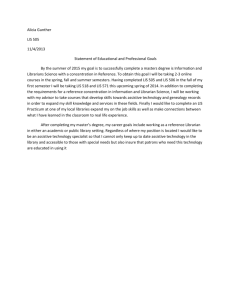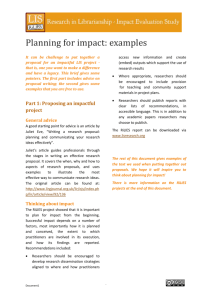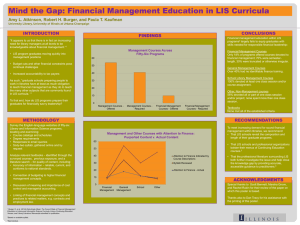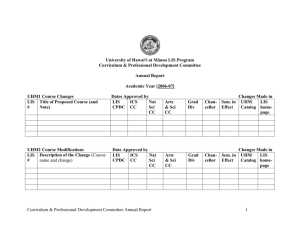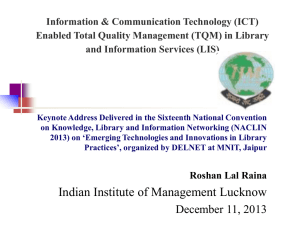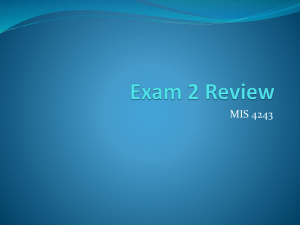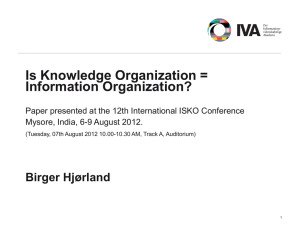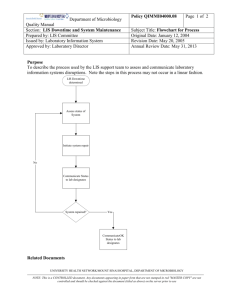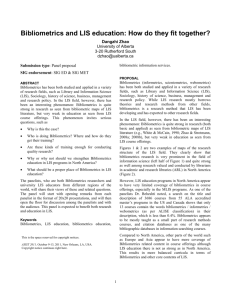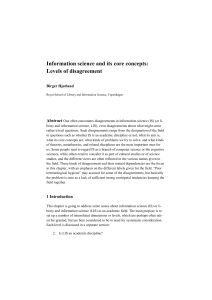The LIS Research Website
advertisement
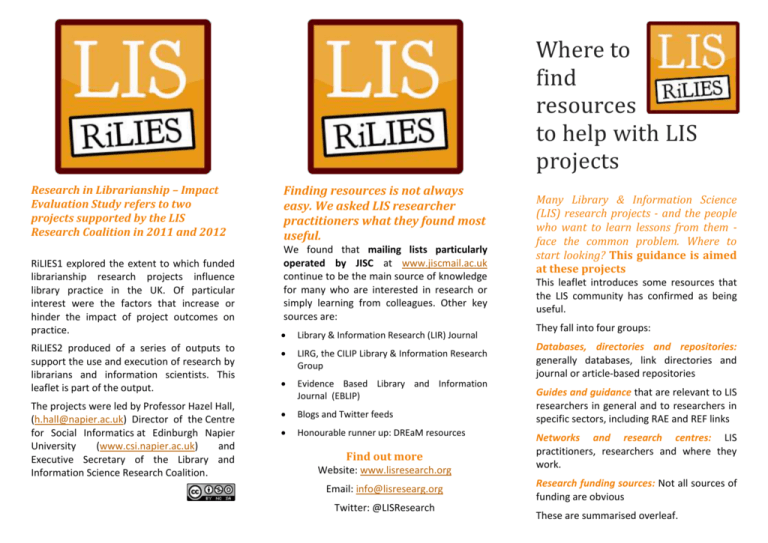
Where to find resources to help with LIS projects Research in Librarianship – Impact Evaluation Study refers to two projects supported by the LIS Research Coalition in 2011 and 2012 RiLIES1 explored the extent to which funded librarianship research projects influence library practice in the UK. Of particular interest were the factors that increase or hinder the impact of project outcomes on practice. RiLIES2 produced of a series of outputs to support the use and execution of research by librarians and information scientists. This leaflet is part of the output. The projects were led by Professor Hazel Hall, (h.hall@napier.ac.uk) Director of the Centre for Social Informatics at Edinburgh Napier University (www.csi.napier.ac.uk) and Executive Secretary of the Library and Information Science Research Coalition. Finding resources is not always easy. We asked LIS researcher practitioners what they found most useful. We found that mailing lists particularly operated by JISC at www.jiscmail.ac.uk continue to be the main source of knowledge for many who are interested in research or simply learning from colleagues. Other key sources are: Library & Information Research (LIR) Journal LIRG, the CILIP Library & Information Research Group Evidence Based Library and Information Journal (EBLIP) Blogs and Twitter feeds Honourable runner up: DREaM resources Find out more Website: www.lisresearch.org Email: info@lisresearg.org Twitter: @LISResearch Many Library & Information Science (LIS) research projects - and the people who want to learn lessons from them face the common problem. Where to start looking? This guidance is aimed at these projects This leaflet introduces some resources that the LIS community has confirmed as being useful. They fall into four groups: Databases, directories and repositories: generally databases, link directories and journal or article-based repositories Guides and guidance that are relevant to LIS researchers in general and to researchers in specific sectors, including RAE and REF links Networks and research centres: LIS practitioners, researchers and where they work. Research funding sources: Not all sources of funding are obvious These are summarised overleaf. Repositories and databases Communities and networks Funding bodies Links to substantive LIS resources – generally databases, link directories and journal or articlebased repositories. Learning and knowledge sharing takes place best with people in your community. Despite the straitened times, there are still sources of funding available for LIS projects. Funding may come from the Research Councils, one of the large foundations, or it may be better to look for resources from smaller, specialist or local bodies. Generation of funds internally is also an option. Journals and journal repositories The first and most obvious source is the Library & Information Research (LIR) journal Evidence Based Library and Information Journal (EBLIP) is an open access, peerreviewed journal published quarterly; provides a forum for librarians and other information professionals to discover research that may contribute to decision making in professional practice. Digital archives Dominated by two large repositories, each hosting in the region of 20 000 articles. dLIST is North American in orientation and eLIS is more European. Informal communities Two good ways to find who shares your interest are to (a) ask on one of the JISC LISmailing lists and (b) look at the blogs listed at uklibraryblogs.pbworks.com Research communities The DREaM network is an excellent place to start for LIS researchers. See further in the block below. Other formal communities include BAILER (British Association for Information & Library Education and Research) and LIRG (Library and Information Research Group). There are also domain specific groups, for instance in the area of healthcare, there is HEALER (Health Information and Libraries for Evaluation and Research); KnowledgeHub may be useful to public-sector practitioners. The DREaM project Links to online resources can be found via www.lisresearch.org/links/ (see below) The LIS Research Website LIS Research Coalition worked to facilitate a co-ordinated and strategic approach to LIS research across the UK from 2009 to 2102. Its website is at www.lisresearch.org and contains links to all the resources mentioned here. The DREaM project (Developing Research Excellence and Methods) has been developing a formal UK-wide network of Library and Information Science (LIS) researchers since 2010. Five project events have been held. More can be found at www.lisresearch.org/dream-project/ Significant funders Some funders direct their grants at organisations, often Universities and other research institutions. These include the Arts & Humanities Research Council (AHRC) and the Leverhulme Trust. Others fund individuals, for instance the British Academy, or could provide funding to communicate research results – for instance the Joseph Rowntree Foundation. LIRG itself provides small awards to LIS researchers for innovation or to communicate research results to practitioners. Another category are the national bodies nclouding Arts Council England, CyMAL in Wales and the Scottish Library & Information Council. Links to these and more can be found via www.lisresearch.org/links/
